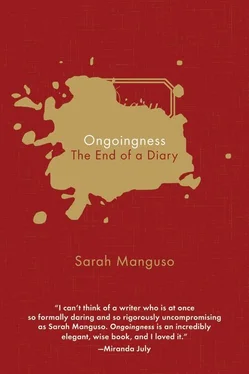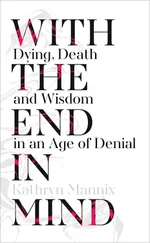Sarah Manguso
Ongoingness: The End of a Diary
I started keeping a diary twenty-five years ago. It’s eight hundred thousand words long.
I didn’t want to lose anything. That was my main problem. I couldn’t face the end of a day without a record of everything that had ever happened.
I wrote about myself so I wouldn’t become paralyzed by rumination — so I could stop thinking about what had happened and be done with it.
More than that, I wrote so I could say I was truly paying attention. Experience in itself wasn’t enough. The diary was my defense against waking up at the end of my life and realizing I’d missed it.
Imagining life without the diary, even one week without it, spurred a panic that I might as well be dead. ♦
The trouble was that I failed to record so much.
I’d write about a few moments, but the surrounding time — there was so much of it! So much apparent nothing I ignored, that I treated as empty time between the memorable moments.
Despite my continuous effort — in public, in private, in the middle of the night, and in moving vehicles — I knew I couldn’t replicate my whole life in language. I knew that most of it would follow my body into oblivion.
From the beginning, I knew the diary wasn’t working, but I couldn’t stop writing. I couldn’t think of any other way to avoid getting lost in time. ♦
I tried to record each moment, but time isn’t made of moments; it contains moments. There is more to it than moments.
So I tried to pay close attention to what seemed like empty time. I made my writing students sit silently for twenty, thirty, forty minutes. Then we all wrote about the almost nothing that had happened. I was always running between the classroom and the photocopier so we could read, right away, about the almost nothing that had just happened.
I wanted to comprehend my own position in time so I could use my evolving self as completely and as usefully as possible. I didn’t want to go lurching around, half-awake, unaware of the work I owed the world, work I didn’t want to live without doing. ♦
To write a diary is to make a series of choices about what to omit, what to forget.
A memorable sandwich, an unmemorable flight of stairs. A memorable bit of conversation surrounded by chatter that no one records. ♦
Why do people keep diaries? Prisoners, explorers, regents — of course. But there are so many others, nobly addressing the entire future.
I was one of the others, but I wasn’t writing to anyone.
Inside the cover of one notebook I copied some lines of poetry as a love letter to my future self:
When you are old and grey and full of sleep ,
And nodding by the fire, take down this book ,
And slowly read, and dream of the soft look
Your eyes had once, and of their shadows deep … ♦
Hypergraphia , the overwhelming urge to write. Graphomania , the obsessive impulse to write. Look up the famous cases if you’re interested. Nothing about them ever helped me with my problem. ♦
Like many girls I was given a diary. The book bore pictures of teddy bears on every page. I wrote in it every now and then out of a sense of duty.
When I was nine I brought the diary to the beach where I went with my parents every summer. My mother reminded me to write in it each night. I didn’t enjoy the task and remember her dictating lines like In the old town center, the shops keep their doors open for all to see.
I didn’t need a diary then. I wasn’t yet aware of how much I was forgetting. ♦
I meet people who consider diary keeping as virtuous as daily exercise or prayer or charity. I’ve tried for years , they say. I start a diary every January. Or I don’t have the discipline. They imagine I have willpower or strength of character. It would be harder for me not to write it , I try to explain. It doesn’t feel like (in one friend’s words) a big fat piece of homework. I write the diary instead of taking exercise, performing remunerative work, or volunteering my time to the unlucky. It’s a vice. ♦
I started keeping the diary in earnest when I started finding myself in moments that were too full.
At an art opening in the late eighties, I held a plastic cup of wine and stood in front of a painting next to a friend I loved. It was all too much.
I stayed partly contained in the moment until that night, when I wrote down everything that had happened and everything I remembered thinking while it had happened and everything I thought while recording what I remembered had happened.
It wasn’t the first time I’d had to do that, but as I wrote about the art opening I realized my self-documentation would have to become a daily (more than daily?) practice.
Today was very full, but the problem isn’t today. It’s tomorrow. I’d be able to recover from today if it weren’t for tomorrow. There should be extra days, buffer days, between the real days.
If I allowed myself to drift through nondocumented time for more than a day, I feared, I’d be swept up, no longer able to remember the purpose of continuing.
Twenty-five years later the practice is an essential component of my daily hygiene. I’d sooner go unbathed. ♦
The first volume, a yellow spiral-bound notebook, was disguised as my math notebook, the word Trigonometry printed in black on the cover, and on every notebook thereafter, I wrote the name of my current math course. During my first semester of college, I created a digital document called Differential Equations. During my second semester, not enrolled in linear algebra as planned (I got a C+ in differential equations), I opened a new file, Differential Equations 1993. Every year since then I’ve opened a new one, hiding everything I thought was important in a file named after a branch of higher math, where, as only a C+ student would, I thought no one would ever look for it.
I still write in little notebooks in diners and on trains, and, after a vigorous editing on the page, I transcribe the remains into Differential Equations 2014. ♦
One afternoon I declined a ride from one city to another with a friend who didn’t survive his twenties. I didn’t think I’d survive the afternoon without spending four hours on the bus back to college thinking and writing about what had happened during my trip. My memory was too full. It was an emergency. I had to empty the reservoir right away.
Nothing had happened, but I still needed four hours to get it into the notebook. ♦
I revised my diary during the day, days later, and sometimes years later, with absolute certainty I never wanted anyone to read it.
Everyone I’ve told finds the idea of my revisions perverse, but if I didn’t get things down right, the diary would have been a piece of waste instead of an authentic record of my life. I wrote it to stand for me utterly. ♦
What if I narrate the same memories aloud each night in the same words? What if the memories degrade a bit more each night anyway? What if the recitation becomes rote but functionally useless?
Because I can’t reliably answer that question, for twenty years, every day, I wrote down what happened. After I finish writing this sentence I’ll do it again.
Читать дальше












